
Frank Miller Owns Batman: “no hope at all”
July 11th, 2011 by david brothers | Tags: frank miller, jim lee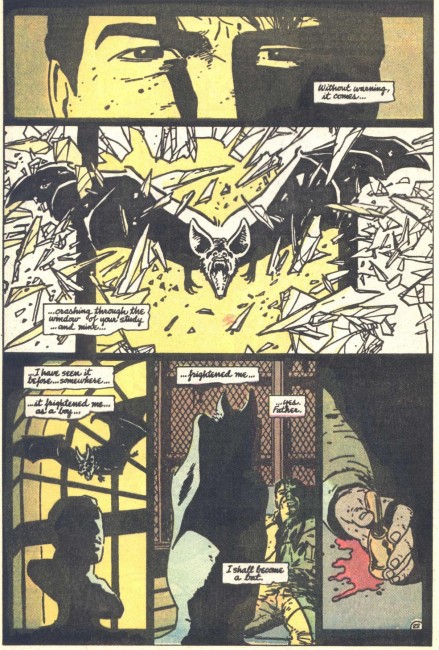
In Frank Miller and David Mazzucchelli’s Batman: Year One, Thomas Wayne loomed large. His influence on Bruce Wayne is the genesis of the Batman, rather than a crime fighter. It’s right there. “…yes. Father. I shall become a bat.”
This positions Batman and his crusade as Wayne’s way of honoring his father. The relative lack of Martha Wayne in Year One–and over the course of the next twenty years of Bat-comics–and Grant Morrison’s time-spanning Batman tales in Batman: The Return of Bruce Wayne suggest that inspiring heroism is something the men of the Wayne family do. They’re following in the footsteps of their fathers.
What about the Wayne women? Ehhhh, they’re cool, I guess. But hey, did you know that the Wayne men freed slaves/fought Nazis/killed monsters/blah blah blah?
Miller and Lee’s All-Star Batman and Robin the Boy Wonder is interesting, because Martha gets all the attention, barring a mention of The Mark of Zorro being Thomas’s favorite movie. (Which, in a way, ties him to the idea of Batman even more directly, because Bruce’s crime fighting persona and decision to become a crime fighter is a direct result of the movie. The son is attempting to impress the father.) Thomas gets short shrift. It’s a notable shift in focus, and one that passed me by on the first read.
My gut wants me to put a hard label on Thomas Wayne’s influence. Children are a product of their parents, and it just makes sense that the same would hold true for Batman. Off the top of my head, Thomas provided the steel that drives Batman. He was a doctor who saved thousands of lives and was dedicated to his job. He understands the power of a calling. He’s the steel in Bruce’s backbone.
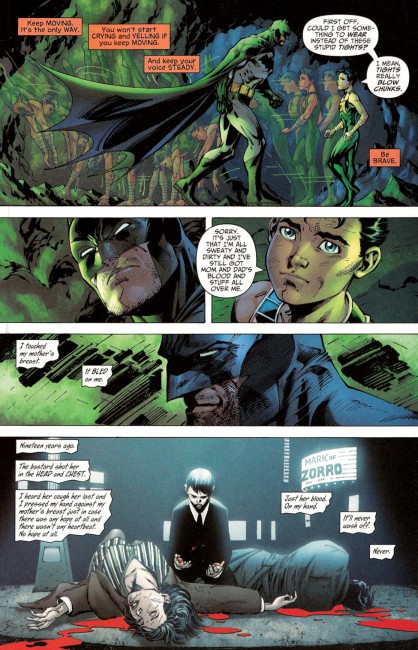
It follows, I think, that Martha is the hope inside Batman, the little voice that elevates him above the Punisher (driven by anger) or Spider-Man (driven by guilt). It is true that his quest is revenge on the nebulous crime. I don’t think that you can argue against that. “I am vengeance. I am the night. I spend a lot of time making people afraid of me.” But at the same time, he’s genuinely trying to protect others from his bogeyman. There’s an altruistic element there, wrapped in a seriously personal crusade.
Bruce Wayne: “I heard her cough her last and I pressed my hand against my mother’s breast just in case there was any hope at all and there wasn’t any heartbeat. No hope at all. Just her blood. On my hand. It’ll never wash off. Never.”
When he says “No hope at all,” that’s the big turning point for Bruce Wayne. That’s the moment his childhood shudders and snaps under the weight of his parents’ murder. There’s an element of guilt in the attention he pays to her blood on his hands, as well.
Miller and Lee attach hope to Martha, and leave Thomas where he landed. There’s something there, isn’t there? It’s the mother as nurturing figure, as support, and when his parents are killed, she’s the one Bruce goes to for comfort. “Maybe they aren’t dead.” But, no: they are. And he is lost.
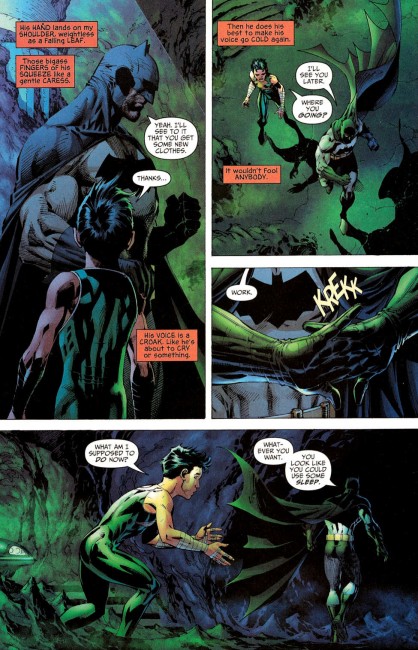
Martha Wayne is why Bruce Wayne relates to Dick Grayson, and regrets how he’s treating him. Wayne’s facade cracks when he thinks of how the murder of his parents affected his life, and it gets him to show real human kindness to Grayson.
The kicker is Alfred. He was there before and after the murder, and he’s the closest thing we have to an outside observer. He’s the only person in the world who can track Wayne’s progress from child to dark knight. He tells a story about how Bruce was always wild, even as a kid. He was innocent, an “angel” Alfred calls him, but wild. He craved adventure.
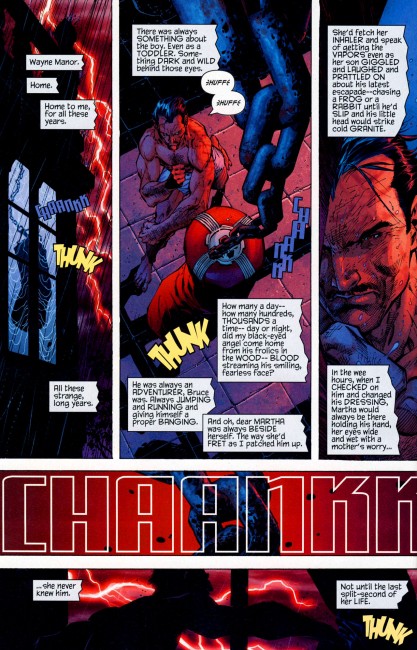
I’ve got enough younger cousins to know that each kid really is a snowflake. Two kids raised by the same people will have wildly different personalities and interests. Some kids are active and will climb anything. Others like jokes. Others are divas. Nurture counts, but nature goes a long way, too. Alfred relating how Bruce was always wild and dark suggests to me that his time as Batman was meant to be. When faced with tragedy, he reacted according to his personality. Others (meaning: everyone else in the entire world) would have mourned and gotten on with their lives. Grayson’s arc would have been a natural one, if not for Batman’s influence. For young Bruce Wayne, though, fighting crime was the sanest possible choice. It was his way of coping with the murder.
Alfred says that Martha never knew her son. He’s right. You can never tell how someone is going to turn out. A sweet kid could pull the wings off flies in private, and a bully might be an utter romantic with the right girl. Martha knew her son as a wild child, someone who would climb and crawl and fall. As she died, she watched her son “become a demon,” Alfred says. The murder knocked all of the innocence out of him like a punch to the stomach.
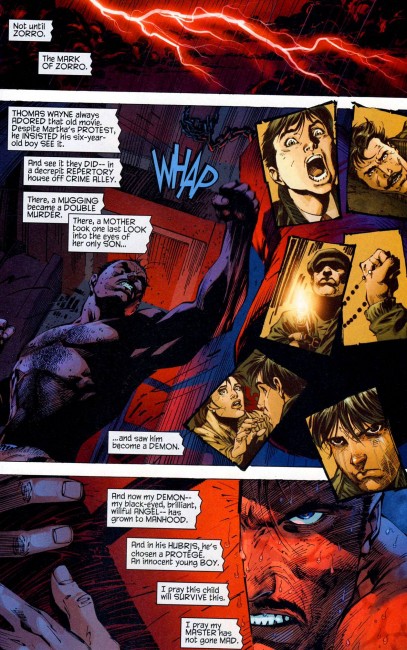
Tie these two scenes together. Bruce Wayne watches and hears his mother die. While that’s happening, she’s looking directly into his eyes. As she dies, as the last vestige of hope in his life slips away, he is lost, and she witnesses it. His childhood breaks in that span of time between her last gasp and her death. What’s left is the wildness, that darkness that haunted his childhood. It brings to mind a line from Dark Knight Returns: “My parents taught me a different lesson… lying on this street… shaking in deep shock… dying for no reason at all. They showed me that the world only makes sense when you force it to.” The cold, hard side of the world poisoned his childhood.
What’s interesting about Miller’s take is how he ties the death of Martha and the idea of hope with Batman’s sadness and softness toward Robin. This is early in his career, and he’s still playacting at being Batman. He’s got a Clint Eastwood growl that he finesses by way of a razor held between his teeth. He laughs like a loon when diving in to fight crime. He’s building a persona, one which will be whittled down over the years into the platonic ideal of Batman.
The hope, the little bursts of sadness here in defiance of his calculated persona, come when Martha slips around and in front of his Thomas Wayne facade. She’s the voice that whispers everything will be okay when his father tells him to buck up and stand tall. She creeps in around the edges of the cape and cowl.
Bruce Wayne is a product of his upbringing, from having loving parents to witnessing their murder, but it was his wild nature that led to the Batman. The result is a creature that’s initially torn between vengeance and hope, a monster who is so sure of what he believes in that he doesn’t think that grief is a valid option, or that acceptance is healthy. No, they’re sacrifices upon the altar of his war. Later, he realizes the error of his ways and manages to reconcile the influences of Martha and Thomas on his methods. For now, he sees himself as a general in a war.
This will change. It has to, really. Will alone can only keep you going for so far.

And that is actually the first time I realized Bruce never mentions his mom. Nice work, here.
And hey, Batman writers? Something to think about.
Great stuff Mr. Brothers. Never a huge DC guy but Batman (done right) is always intriguing.
I hate this ASBAR with everything in me, but this is a great series of essays on why I shouldn’t.
@Jeff Holland: Andrew Vachss worked Martha Wayne heavily into his novel Batman: The Ultimate Evil.
I like the idea that Batman opens up to Robin because of Martha. Martha was the one that worked with abused kids (according to the Vachs novel) and it was Martha that Bruce felt compassion towards in his parent’s final breaths.
I also like how the Flashpoint:Batman twists this narrative. In a story where Bruce dies instead of Thomas and Martha, it is Thomas that becomes the driven man and Martha who becomes insane, specifically towards children. They become the perversion of Miller’s interpretation of Thomas and Martha. Instead of being the bold man in control who saves, he becomes a driven man who controls but does it for his own satisfaction and not to save anyone. Instead of Martha’s compassion shining through the rough exterior, Martha’s compassion becomes twisted and she begins to kidnap and abuse children in order to keep them “safe.”
The balance of compassion and strength that was struck in Batman when his parents were killed does not apply to his parents if Bruce is killed.
the current books seem to be making Martha the reason Thomas Wayne was who he was. And she was Bruce’s guide/host whatever you want to call it in “Whatever happened to the Caped Crusader?”